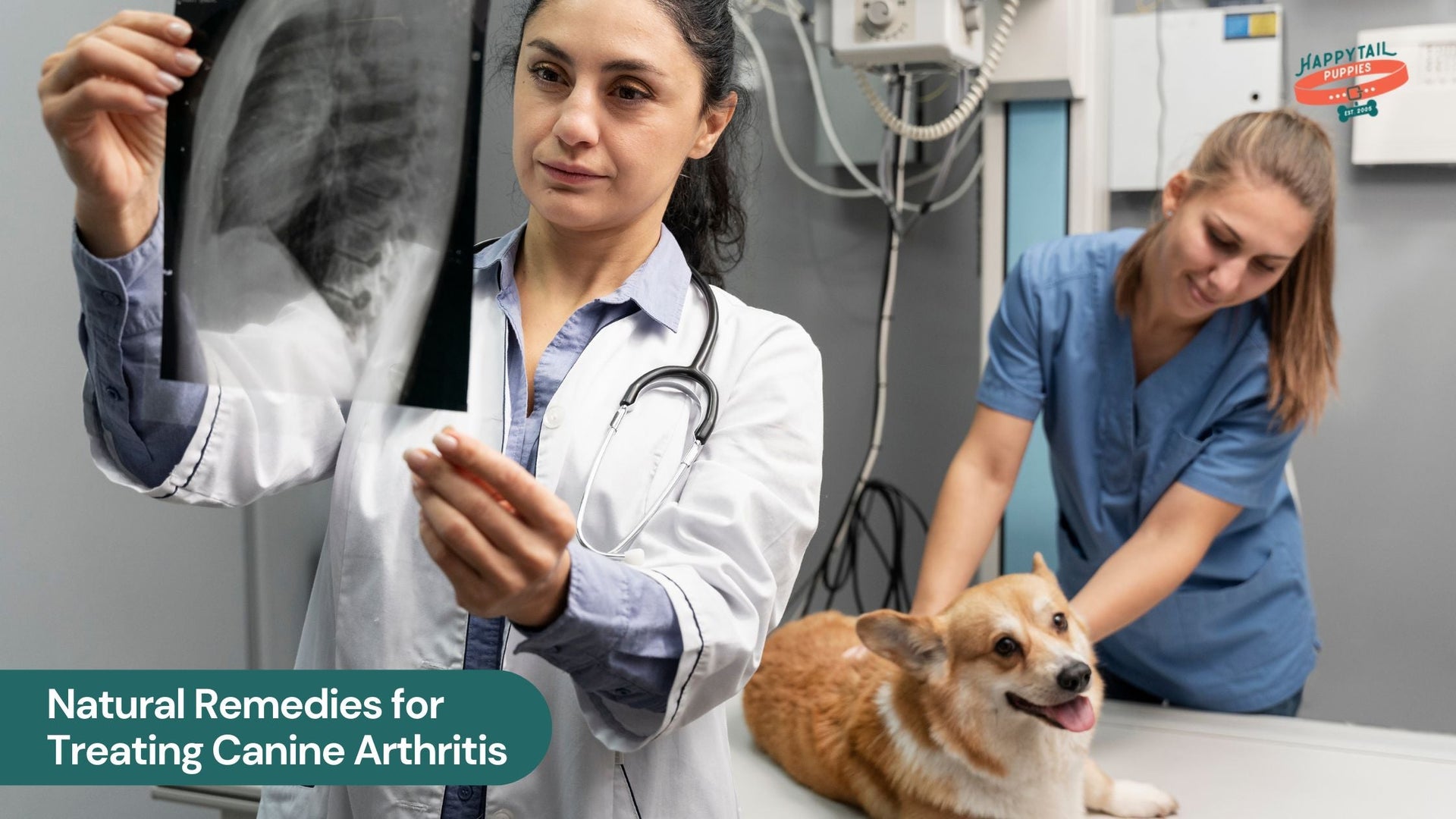Natural Remedies for Treating Canine Arthritis: What Actually Works
Is your dog battling arthritis? Discover natural ways to ease their pain. Learn about diet, supplements, physical therapy, and home care for happier joints and improved mobility.
Dogs are known for their playful, vivacious spirit; however, conditions such as arthritis rob them of this happiness, turning them into reluctant or lethargic movers. Pet parents are left to watch helplessly as their furry companions start struggling with their daily tasks, such as climbing stairs, going for walks, or standing up. It imposes a huge emotional stress on humans in finding their loyal companions in pain, which makes it important to search for holistic solutions that go way beyond the OTC medications.
The Journal of Veterinary Internal Medicine found that dietary omega-3 fatty acids significantly improved weight-bearing and overall mobility in dogs, particularly those with osteoarthritis. The natural therapies offer better hope for a lasting and safe relief without any vulnerabilities that are often linked to heavy medications. In today's post, we will explore the most natural and proven approaches for treating canine arthritis.
Arthritis in Dogs
If you suspect that your furry companion is in pain and wonder if they are suffering from arthritis, the first step is to visit a veterinarian to determine the appropriate diagnostic path. We should know that the signs of dog arthritis include:
- Limping or walking only on specific legs
- Moving or walking stiffly
- Lying down with care or standing up to avoid any painful positions
- Unwilling to jump, run, or climb
- Recoiling in pain when certain limbs are touched.
The most crucial step here is to visit a veterinarian who can accurately diagnose arthritis in dogs. They will conduct a few specific physical examinations, discuss their symptoms, and, if required, take radiographs.
If your dog is suffering from arthritis, your vet will create a custom pain management plan based on various factors, including their age, breed, metabolic condition, and the severity of the disease. An early diagnosis helps your vet to craft a personalized dog arthritis treatment plan that is well-suited to the type of pup you have.
Ways to Relieve Your Dog’s Pain at Home
Contact your veterinarian if you suspect your dog is in pain. After an extensive diagnosis and examination, you can use certain home remedies to relieve your dog, in addition to the vet-suggested treatment options.
Glucosamine and Chondroitin for Joint Repair
Glucosamine and chondroitin are two of the most prescribed supplements for dogs with arthritis. The compounds aid in cartilage repair and rebuilding, enhance joint lubrication, and promote overall joint mobility. Many veterinarians use them as part of the best treatment for dogs with arthritis, as they can be administered over an extended period and have minimal side effects when used correctly. These types of supplements are especially beneficial for small breeds that are more prone to joint problems, such as Dachshunds, due to their unique body structure.
The recommended dose is 20-25 mg/kg of glucosamine and 14 mg/kg of chondroitin, based on the dog's weight. Research indicates that it may take up to four to six weeks for results to be evident, and therefore, patience and regular administration are crucial. Veterinary-grade products are of high quality, ensuring better absorption and purity, making them a wise choice for pet owners seeking natural joint support.
Omega‑3 Fatty Acids to Reduce Inflammation
Omega-3 fatty acids elicit powerful anti-inflammatory responses, which aid arthritic dogs in recovering their mobility and reducing joint discomfort. These good fats act by reducing pro-inflammatory markers, which means improved flexibility and reduced stiffness. Dogs given omega-3 supplements tend to be more energetic and are more willing to remain active.
An experiment conducted by The Journal of Nutrition showed that supplementation with EPA and DHA induced great changes in gait and weight-bearing in arthritic dogs. High-quality fish oil certified as pure is a good choice for safety and optimal outcomes. Natural usages of long-term consumption under veterinary supervision favor joint health.
Green‑Lipped Mussel as a Natural Anti-Inflammatory
New Zealand green-lipped mussels provide a powerful combination of omega-3 fatty acids, glycosaminoglycans, and antioxidants. These bioactives help combat joint inflammation, supporting cartilage repair and overall joint function. Dogs who take these supplements are usually noted to have reduced stiffness and increased energy levels in their daily activities. Green-lipped mussels are generally considered one of the best natural remedies for canine arthritis, as they contain unique nutrients that are beneficial in maintaining joint health.
The standard dose ranges from 300 mg to 2,400 mg, depending on the breed size. Delicate nutrients are preserved in high-quality, freeze-dried, or encapsulated forms to ensure maximum benefit. The regularity of supplementation is crucial, as the effects of therapy accrue over time. Combining with other holistic therapies usually increases the long-term outcomes of arthritic dogs.
Turmeric (Curcumin) for Pain Management
The active ingredient in turmeric, curcumin, has a natural anti-inflammatory and antioxidant effect, which helps reduce joint pain. It functions by inhibiting pathways such as COX-2 and NF-κB, which are involved in catalyzing inflammation and pain in arthritis. Turmeric is a holistic, mild alternative to pain management in older dogs that many pet owners choose. The anti-inflammatory properties of curcumin make it an ideal choice for holistic pain management for dogs with arthritis.
Curcumin has low oral bioavailability; therefore, supplements often increase bioavailability by combining curcumin with black pepper extract or encapsulating it in liposomes. The suggested doses should be 10- 15 mg per pound of body weight. Safe use is guaranteed through veterinary instructions, particularly in case of dogs under medication or with sensitive stomachs.
CBD Oil for Comfort and Mobility
CBD oil is a natural means of reducing chronic pain and anxiety among arthritic dogs. It communicates with the endocannabinoid system, decreasing pain transmission and enhancing relaxation without psychoactivity. After some weeks of regular use, dogs tend to move more and feel less pain.
The starting dosage is typically 0.05-0.1 mg per pound of body weight, and the dosage is adjusted under the supervision of a veterinarian. Use only the certified CBD products that have been tested as pure and without THC. Regular monitoring can also help track progress and ensure a safe and successful experience for pets seeking relief from joint pain.
Bone Broth and Nutrient-Rich Diets
Bone broth provides glucosamine, chondroitin, and collagen in a natural way, which helps support joint health and hydration. Its mild composition allows it to be of significant assistance to older dogs who have low appetites.
Make broth by boiling organic bones in a bit of vinegar and vegetables for 12-24 hours. Strain carefully before serving, and consume 1–2 tablespoons daily over meals. This easy-to-make remedy promotes healthy cartilage and overall vitality. Others consider a raw food diet for dogs a holistic approach, but a visit to the vet is essential before making any changes to the dog's diet.
Physical Therapy and Gentle Exercise
Physical therapy helps preserve the strength and flexibility of the muscles, which in turn relieves the pain in the joints. Controlled exercises, such as hydrotherapy or walking on a leash, stimulate circulation and decrease stiffness. Activities that do not stress the body, such as hydrotherapy, are particularly beneficial for breeds like French Bulldogs, which are prone to joint problems.
Exercises, when performed with a canine rehabilitation specialist, are tailored to the dog's specific needs and requirements. Sessions typically involve a combination of massage, stretching, and low-impact movements to achieve optimal results. Consistency drives lasting improvement in mobility and comfort.
Weight Management for Joint Relief
Extra weight increases stress on joints, which can accelerate arthritis symptoms. A thinner body minimises pain and improves the quality of life of affected dogs. Maintaining a dog's fitness and slimness can be regarded as one of the most effective therapies for arthritic dogs, as it eases the burden on joints and enhances mobility.
Veterinarians recommend a slow rate of weight loss, typically 1 to 2 percent per week, achieved through calorie-restricted diets and moderate, frequent exercise. Frequent assessment of the improvement can lead to a long-term healthy weight and prevent harm to the joints in the future. Dismissing weight concerns may exacerbate the arthritis symptoms and cause other health problems associated with the dangers of obesity in dogs.
Acupuncture and Alternative Therapies
Acupuncture promotes joint health by increasing blood circulation, releasing endorphins, and reducing inflammation. This ancient ritual is becoming increasingly common in veterinary care as an adjunct to traditional treatment. A course of sessions can reduce pain and improve mobility in dogs.
Evidence-based complementary and Alternative Medicine studies have found that acupuncture can alleviate lameness and improve the quality of life in arthritic dogs. The certified veterinary acupuncturists will customize the sessions according to the needs of each dog and will begin with weekly sessions, gradually reducing them to maintenance sessions as needed. Acupuncture can be used in conjunction with other treatments to provide a holistic approach to managing aging joints.
Herbal Support: Boswellia and Yucca
Some common herbs used to help treat arthritic dogs naturally include Boswellia serrata and yucca root. They both contain bioactive compounds that inhibit pro-inflammatory enzymes, which cause swelling and joint pain. Research indicates that boswellic acids in Boswellia support the health of cartilage, and saponins in yucca help lower toxins associated with inflammation.
Supplements approved by veterinarians provide standardized extracts, ensuring consistent results with no dangerous fillers. The use of small doses reduces the digestive irritation and makes the transition gradual. Regular monitoring helps track improvements in mobility and comfort. For pet owners who explore herbal solutions, pet insurance may help cover the unexpected expenses associated with alternative treatments.
Probiotics for Gut and Joint Health
Probiotics in dog nutrition help regulate the gut microbiome, which plays a crucial role in immune system function and the control of inflammation throughout the body. Probiotics can be an effective supplement to an arthritis treatment regimen, as they indirectly support joint health by reducing inflammation. Dogs with a healthy microbiome tend to have more energy and less joint stiffness.
Choose strains such as Lactobacillus and Bifidobacterium because they are known to have anti-inflammatory properties. Veterinary-formulated probiotics ensure safety, proper dosing, and high-quality ingredients. A slow introduction can prevent gastrointestinal discomfort and promote overall health. Digestive health is a key benefit of regular use, which is beneficial to joint health and overall vitality in aging dogs.
Home Modifications for Better Comfort
A few modifications around the house make the environment more accommodating and safer for arthritic dogs. The beds used by orthopedics patients have cushions to prevent pain in the joints, and non-slip mats are used to avoid accidents when walking on hard floors. Ramps will allow dogs to get on furniture or cars more easily without straining their inflamed joints.
The stress that can increase pain perception is also reduced by mental stimulation, such as using puzzle toys and gentle massage. Maintaining a calm and predictable environment helps keep individuals comfortable. The minor changes make a difference and enhance the mobility and independence of senior dogs with arthritis. The changes serve as a complementary to other natural arthritis management solutions.
Conclusion
It is also important to keep your dog active as much as possible to help them shed some weight, a crucial measure in managing arthritis pain in dogs. Rewers says, a high body weight translates to more pressure on the joints. You can keep dogs active by taking short, frequent walks or playing games, such as hide and seek, even when your dog can hardly move.
When a pet parent considers using natural arthritis remedies in their pet, which may include dietary or lifestyle changes, they should consult a trusted veterinarian to determine the best course of action for managing the pain and treating their dog.


